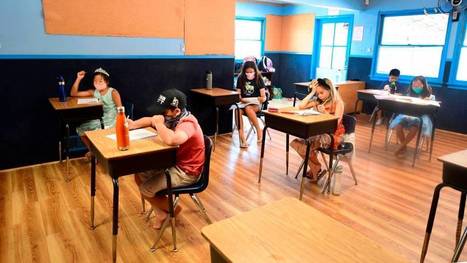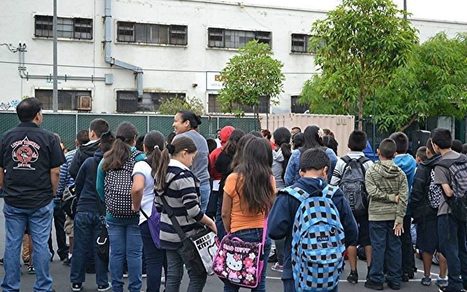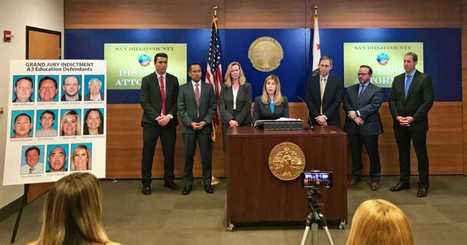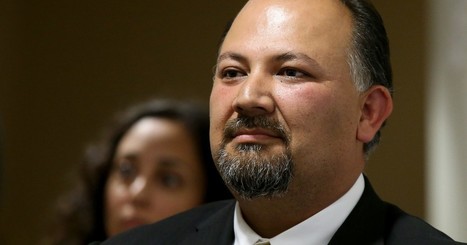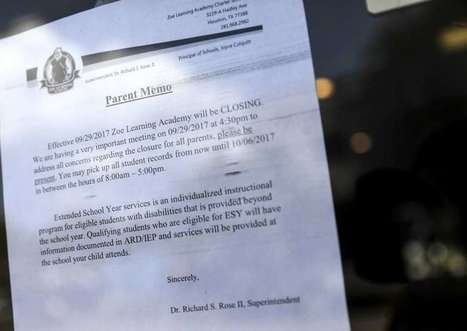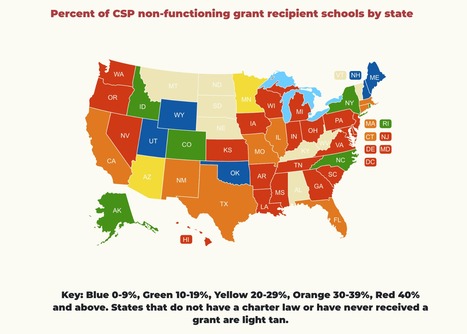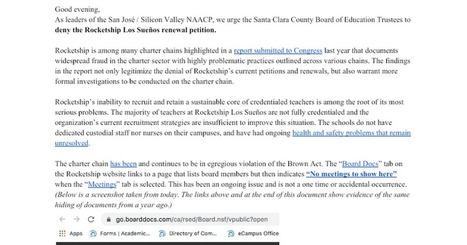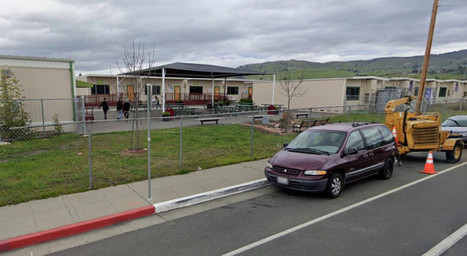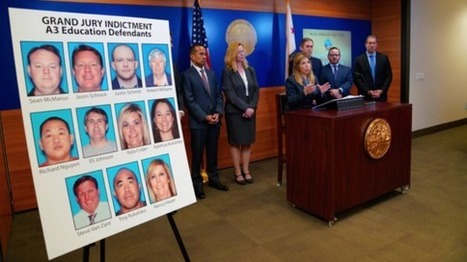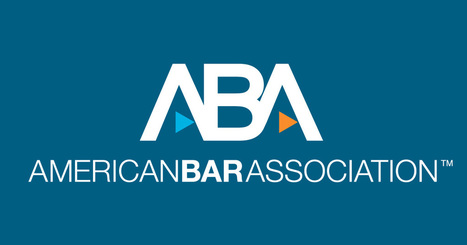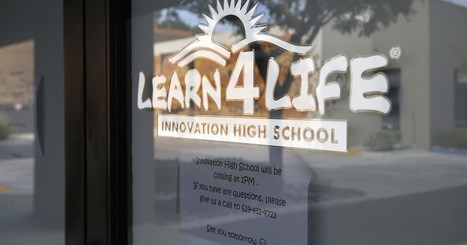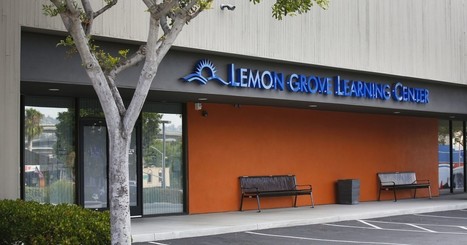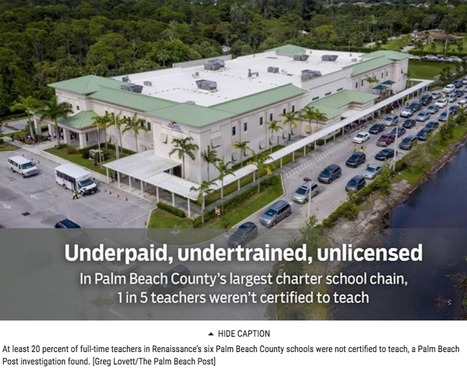 Your new post is loading...
 Your new post is loading...

|
Scooped by
Roxana Marachi, PhD
December 19, 2020 8:16 AM
|
Richard Welsh & Michelle Hall - 2018
"Context: Given the growing popularity of the portfolio management model (PMM) as a method of improving education, it is important to examine how these market-based reforms are sustained over time and how the politics of sustaining this model have substantial policy implications.
Purpose of Study: The purpose of this article is to examine important patterns and trends in the relationship between campaign contributions to local and state school board elections and the sustainability of the PMM in urban districts. We provide a descriptive analysis of the role of interest groups in education reform in post-Katrina New Orleans and document how the PMM changed the landscape of education politics, with a focus on the actors, both local and national, that sustain the PMM.
Research Design: We describe the creation of Act 35 and the evolution of educational governance changes in New Orleans to determine whether the same interest groups that played a role in the origin of the PMM also contributed to its sustainment. We analyze how these educational governance changes influenced the politics of education reform using data from the Louisiana Ethics Commission on campaign contributions to both state and local school board elections. We apply several non-board and board governance theories to examine interest group behavior. We also conduct interviews with stakeholders throughout the educational system to inform our discussion of the evolution of educational governance and the politics of education reform in post-Katrina New Orleans, as well as the categorization of candidates in school board elections.
Results: We find that in the post-Katrina era, there was a diversification of actors in the interest group landscape. These groups influenced educational governance through unprecedented levels of campaign contributions to the state and local school board elections. The influence of interest groups, especially out- of- state actors, contributed to an emerging shift in political control from “traditional” school board candidates to an increase in “pro-reform” board members. Conclusions: The PMM is accompanied by heightened interest as well as an influx of out-of-state actors in educational policy making and the provision of public education. Unprecedented levels of campaign contributions suggest that state and local school board elections may be one of the primary mechanisms through which interest groups influenced post-Katrina educational governance. Out-of-state campaign contributions were mostly in support of pro-portfolio candidates. There appears to be tangible national support for the PMM that may play a crucial role in sustaining these reforms." For full post, please visit: https://www.tcrecord.org/Content.asp?ContentID=22116

|
Scooped by
Roxana Marachi, PhD
July 30, 2020 9:25 PM
|
More than 80 percent of California children are in districts that Governor Gavin Newsom says must use remote-only learning when schools return. That's prompted some parents to search for tutors or teachers to come to their homes - sometimes in pandemic pods with several families - to oversee distance learning. But these are options only available to those who can afford them, and it's raising concerns about further exacerbating rampant inequalities in public education. We'll talk about the rush for private teachers and the questions it raises about equity. https://www.kqed.org/forum/2010101878793/parents-turning-to-tutors-pandemic-pods-to-help-with-remote-learning

|
Scooped by
Roxana Marachi, PhD
December 2, 2019 1:42 PM
|
"On Monday, an Indiana deputy attorney general asked a judge to dismiss West Lafayette schools' challenge of a law allowing charter schools to claim unused public school buildings for $1. The judge agreed and ordered the school district to notify the state that Happy Hollow Elementary School is available to potential charter operators.
Deputy Attorney General Kelly Earls argued that West Lafayette's complaint was “hypothetical” because no charter school had laid claim to the building.
What's not hypothetical is the real estate racket that has allowed charter school operators to drain millions of dollars from Indiana and other states. West Lafayette's lawsuit represents a worthy effort to protect taxpayers' investment in their communities. The state, in turn, fights to serve the interests of an industry that has long prospered at public expense.
As majority party lawmakers double down on claims the money they have allocated for schools ends up with administrators instead of teachers, an honest accounting of Indiana's charter and voucher school costs is warranted. West Lafayette Community School Corp.'s lawsuit focuses on a single example of how our elected officials support privatization at the expense of students and teachers. The charter school industry is no friend to either.
A decade ago, The Journal Gazette reported a local charter school, Imagine MASTer Academy, was using state tax dollars to pay a for-profit landowner nearly triple in rent what it could have paid to own its building outright.
No one – not the governor, attorney general or any lawmaker – stepped up to protect taxpayers from that poor deal. None showed interest in the growing number of national headlines about charter school real estate scams. In announcing last week it was getting out of the charter school business, the former property owner of Imagine MASTer Academy illustrated why West Lafayette and other public school districts must challenge Indiana law.
Admittedly, the complex shell game is tough to follow, but no one should doubt who is prospering when an out-of-state real estate investment company boasts of 10.5% returns on a charter school portfolio that just sold for $454 million. Is it any wonder Indiana teacher salaries weren't growing?
EPR Properties of Kansas City, Missouri, bought Imagine's North Wells Street campus in 2008 from Schoolhouse Finance, the real estate arm of Imagine Schools Inc., a management group hired by businessman Don Willis and other area residents to operate the local charter school. The sales price was $5.5 million. Two years earlier, Schoolhouse had bought the campus from the YWCA. EPR, a real estate investment trust, sold it back to Schoolhouse eight years later for nearly $7.4 million. Just two years later, it was sold to Wallen Baptist Church for $3.25 million.
In the interim, Indiana taxpayers made rent payments of nearly $2 million in a three-year period alone. Under a triple net lease, the public was also on the hook for the for-profit company's property taxes, insurance and maintenance. When the charter school faced closure because of poor academic performance in 2013, Imagine was converted to Horizon Christian School. State officials, under another charter-friendly law, forgave $3.6 million in loans to Imagine.
We don't know how much Horizon Christian School paid in rent during its six years at the Wells Street site.Although the school, now at3301 E. Coliseum Blvd., is supported almost entirely by taxpayer-funded vouchers, its financial affairs are not subject to public access laws.
West Lafayette Community Schools Superintendent Rocky Killion said Tuesday that his district hopes to persuade local taxpayers and school districts affected by the $1 charter school provision to join their lawsuit. Perhaps another judge can be convinced that requiring taxpayers to give the school buildings they paid for to the highly profitable charter school industry is unconstitutional. Better yet, lawmakers truly interested in supporting Indiana students and teachers will demand the law be repealed. For full post, please visit: https://www.journalgazette.net/opinion/20191127/uncharted

|
Scooped by
Roxana Marachi, PhD
November 11, 2018 5:19 PM
|
To download, click on title or arrow above. File is a pdf with live links to cited documents. Selected/related links are below: Privatizing Schooling and Policy Making: The American Legislative Exchange Council [ALEC] and New Political and Discursive Strategies of Education Governance // Educational Policy http://epx.sagepub.com/content/early/2014/04/28/0895904814528794.abstract
Cashing In On Kids: 172 ALEC Education Bills Push Privatization in 2015 https://www.prwatch.org/news/2016/03/13054/cashing-kids-172-alec-education-bills-2015 How Online Companies Bought America’s Schools
https://www.thenation.com/article/how-online-learning-companies-bought-americas-schools/ The Profit Motive Behind Virtual Schools in Maine www.pressherald.com/2012/09/01/virtual-schools-in-maine_2012-09-02 K12Inc: California Virtual Academies’ Operator Exploits Charter, Charity Laws For Money, Records Show https://www.mercurynews.com/2016/04/17/k12-inc-california-virtual-academies-operator-exploits-charter-charity-laws-for-money-records-show/ Enrollment in California Public Versus Charter Schools https://www.cde.ca.gov/ds/sd/cb/ceffingertipfacts.asp Santa Clara County Office of Education Annual Charter School Databook https://www.sccoe.org/supoffice/charter-schools-office/Documents/2016-17%20Charter%20School%20Report%20Final.pdf Death By A Thousand Cuts: Racism, School Closures, and Public School Sabotage // https://www.j4jalliance.com/wp-content/uploads/2014/02/J4JReport-final_05_12_14.pdf IES National Center for Education Statistics: Percentage of Public School Students Enrolled in Charter Schools, By State (2014) https://nces.ed.gov/fastfacts/display.asp?id=30 Center for Media and Democracy Publishes List of [2,200]+ Closed Charter Schools (with Interactive Map) http://sco.lt/6KOm6z The Perfect Storm: Disenfranchised Communities [Video] https://vimeo.com/161523742 “School Closure Playbook” – [Video] https://vimeo.com/120338240 Charter School Closure Leaves Parents Scrambling For Alternatives http://www.sacbee.com/news/local/education/article199107149.html The Continuum of Structural Violence: Sustaining Exclusion Through School Closures http://sco.lt/9IcTKb KIPP Refuses Agreement To Abide By Conflict of Interest Law: Gets Approved By State Board of Education https://eduresearcher.com/2018/03/13/denykipp/ How Did The State Board of Education Vote on Controversial Charter School Petitions? https://eduresearcher.com/2018/09/07/how-will-state-board-of-education-vote-on-controversial-charter-school-petitions/ Separate and Unequal: The Problematic Segregation of Special Populations In Charter Schools Relative to Traditional Public Schools // Stanford Law and Policy Review http://nepc.colorado.edu/blog/are-charters-beacons Charter Schools, Civil Rights, and School Discipline: A Comprehensive Review: The Center for Civil Rights Remedies (UCLA) https://www.civilrightsproject.ucla.edu/resources/projects/center-for-civil-rights-remedies/school-to-prison-folder/federal-reports/charter-schools-civil-rights-and-school-discipline-a-comprehensive-review/losen-et-al-charter-school-discipline-review-2016.pdf Are California’s Charter Schools The New Separate But Equal “Schools of Excellence”, or Are They Worse Than Plessy? https://papers.ssrn.com/sol3/papers.cfm?abstract_id=3128802 How Privatization Increases Inequality: Section 5: Privatization Perpetuates Socioeconomic and Racial Segregation // In The Public Interest https://public.tableau.com/profile/civil.rights.project.at.ucla#!/vizhome/CostofCASuspensions/DistrictDash NAACP Resolution Calling for a Moratorium on the Expansion of Charter Schools [Original] https://eduresearcher.com/2016/10/21/naacp/ KIPP Refuses To Abide By Conflict of Interest Code; Gets Approved By State Board of Education: https://eduresearcher.com/2018/03/13/denykipp/ [Link no longer active – this was original document for State Legal Counsel’s opinion that a “charter school is subject to” government code 1090] https://cde.app.box.com/v/SBE2018MARCH/file/282675343163 Charter School Vulnerabilities to Waste, Fraud, and Abuse
http://populardemocracy.org/sites/default/files/Charter-School-Fraud_Report_2017 Rocketship Pushes Expansion Despite State Denials and Strong Community Opposition // https://eduresearcher.com/2016/03/09/rocketship-pushes/ John Danner (Co-Founder of Rocketship) Why Blended Schools Are “Whales” In The Ed Institutional Context Quote: “Schools like Rocketship will be a great way to test and validate products and we are happy to do it…” https://beyondschools2.blogspot.com/2012/ New Orleans Charter School Problems Exposed at NAACP Hearing https://eduresearcher.com/2017/04/29/nola-charter/ “Blended Learning: A Wise Giver’s Guide to Tech-Assisted Teaching” // Philanthropy Roundtable (formerly chaired by B. Devos) // http://www.philanthropyroundtable.org/file_uploads/Blended_Learning_Guidebook.pdf Breaking Point: The Cost of Charter Schools For Public School Districts https://www.inthepublicinterest.org/report-the-cost-of-charter-schools-for-public-school-districts/ Education School Dean: Urban School Reform Is Really About Land Development (Not Kids) // https://www.washingtonpost.com/news/answer-sheet/wp/2013/05/28/ed-school-dean-urban-school-reform-is-really-about-land-development-not-kids/?utm_term=.ef77a9f69fd5 Charter Schools, Race, and Urban Space: Where The Market Meets Grassroots Resistance // http://sco.lt/6vGDMf Spending Blind: The Failure of Policy Planning In California’s Charter School Funding // https://www.inthepublicinterest.org/wp-content/uploads/FINAL_ITPI_SpendingBlind_April2017.pdf A Comprehensive Guide To Charter School Closure http://sco.lt/80B85Z San Pablo Rocketship Appeal to State Board in Sacramento (Video with evidence of expanding gaps) https://www.youtube.com/watch?list=PLgIRGe0-q7Safim1TwdTNlcV7auIbigPr&v=uHpH63PsXKs Cybercharters Have An Overwhelmingly Negative Impact http://blogs.edweek.org/edweek/DigitalEducation/2015/10/CREDO_online_charters_study.html Virtual and Blended Learning Schools Continue to Struggle and Grow http://nepc.colorado.edu/newsletter/2016/04/virtual-schools-annual-2016 Red Flags Known and Overlooked With State Board Votes On San Jose Charter Schools // https://eduresearcher.com/2018/01/18/charter-red-flags/ How Will State Board of Education Vote on Controversial Charter School Petitions? // https://eduresearcher.com/2018/09/07/how-will-state-board-of-education-vote-on-controversial-charter-school-petitions/ Understanding Policies that Charter Operators Use for Financial Benefit https://nepc.colorado.edu/publication/charter-revenue New Report Uncovers Systematic Failure by California Charter Schools to Meet Local Control Obligations https://www.publicadvocates.org/uncategorized/22875/ KIPP subset of posts on Charter Schools & “Choice”: A Closer Look page: https://www.scoop.it/t/charter-choice-closer-look?q=kipp Rocketship subset of posts on Charter Schools & “Choice”: A Closer Look page // https://www.scoop.it/t/charter-choice-closer-look?q=rocketship For more with current updates, please see: http://bit.ly/chart_look
http://bit.ly/privatization_explained
http://bit.ly/naacp_resolution

|
Scooped by
Roxana Marachi, PhD
October 12, 2019 11:32 PM
|
"Six county superintendents say a state audit is necessary "to prevent further waste of public education dollars" by Inspire" By Kristen Taketa, The San Diego Union-Tribune
[Selected quotes from original post]
"A statewide group of county superintendents has requested a sweeping state audit to investigate potential fraud by the Inspire home charter school network.
The superintendents say they have reason to believe Inspire engaged in fiscal malfeasance, conflicts of interest, manipulation of enrollment and revenue and other improper activity.
“The concerns regarding Inspire are pervasive across the state, and require immediate attention to prevent further waste of public education dollars and profiting off state apportionment not used to provide a complete and quality education to the students enrolled in the school,” six county superintendents wrote in a letter last week to the Fiscal Crisis Management and Assistance Team, or FCMAT, the state agency that audits schools for fraud. The superintendents asked the state team to audit all schools affiliated with or controlled by Inspire, which is based in Duarte. The six superintendents represent the Ventura, Placer, El Dorado, Sutter, Kern and Los Angeles counties.
San Diego County Superintendent Paul Gothold sent the state team a separate letter with his own concerns, adding to the request by the six superintendents. San Diego County has two Inspire schools authorized by the Dehesa School District: Cabrillo Point Academy and Pacific Coast Academy.
The state fiscal team must fulfill audit requests received by county superintendents, and is currently auditing the Sweetwater Union High School District for potential financial fraud.
Some of the superintendents said that they had concerns about individual Inspire schools dating back a couple years. But it wasn’t until they started talking with other superintendents who had encountered Inspire schools that they realized there were larger patterns connecting them, said Kern County Superintendent Mary Barlow. “That is when we really started seeing patterns develop that concerned us greatly,” she said. “There is a potential here for fraud on a magnitude that I’ve not seen,” said Barlow, who is a former state fiscal team deputy officer and helped conduct fraud audits in the past. ... “Inspire’s operations include the same or similar conduct as those of individuals operating charter school management organizations, vendors and charter schools now facing criminal charges,” the six superintendents wrote. The six superintendents included 13 pages of allegations in their letter, including claims that:
- Inspire has manipulated student enrollment, attendance and revenue among “commonly controlled corporations.” That, in addition to inter-borrowing among Inspire schools and those corporations, “amounts to fiscal malfeasance on the part of Inspire,” the superintendents wrote.
- Inspire appears to provide only a partial educational program and requires parents to provide most of the instruction and curriculum for their children, partly through enrichment funds that Inspire gives parents to buy classes, curriculum, extracurricular activities and more.
- Inspire schools have shown irregularities and misreporting in their attendance accounting.
- Inspire has operated at locations in counties where they had no schools authorized and where they were not legally allowed to operate. The majority of students at multiple Inspire schools live outside the county in which they were authorized.
- Inspire has grown rapidly by seeking authorization from small school districts which lack capacity to provide strong oversight. Inspire schools have grown at rates faster than the enrollment projections originally written in their charters.
- Above all the Inspire schools is a nonprofit corporation, Inspire District Office, that is “profiteering from the rapid expansion of these charters,” superintendents said. Inspire District Office collects 15 percent of Inspire schools’ revenue and is led by the same person who helped open Inspire schools, yet it keeps its finances secret and claims to be exempt from public records law.
- Superintendents said there are inter-related party transactions and conflicts of interest among Inspire’s executive officers and directors."...
For full story, please visit:
https://www.edweek.org/ew/articles/2019/10/10/california-to-audit-charter-school-network-for.html

|
Scooped by
Roxana Marachi, PhD
October 12, 2019 11:20 PM
|
As reported by numerous media outlets, including a detailed report from WBBM-TV/CBS 2 Chicago, activities at Horizon Science Academy - McKinley Park are the subject of a federal lawsuit alleging mistreatment of 8-year-old student Zacharion Townsend. On September 30, his father, Anthony Townsend, filed Townsend v. Concept Schools NFP et al naming defendants at Horizon Science Academy, including teacher Sarah Krippinger and gym instructor Kale Graham.
In addition to the lawsuit, Anthony Townsend has published a Change.org petition — Abuse of Zacharion Townsend by Teacher Sarah Krippinger — presenting his lengthy narrative of events related to the lawsuit. Horizon Science Academy issued a statement noting their internal investigative process every time a claim of bullying arises, reports said. Named defendant Concept Schools NFP is the parent organization of Horizon Science Academy"... For full post, please visit: https://mckinleypark.news/news/518-horizon-science-academy-subject-of-federal-lawsuit

|
Scooped by
Roxana Marachi, PhD
May 28, 2019 6:55 PM
|
This story is part of our “Grading Charter Schools” series examining the impact of privatized education in California.
"School suspensions are out, restorative justice is in. At least that’s the case at the Los Angeles Unified School District and wherever schools are struggling to shift from the harsh, zero-tolerance discipline of the past to a less punitive, problem-solving approach. Restorative justice de-emphasizes punishment and instead aims to repair the damage that is done when, for example, a child disrespects a teacher, or a student starts a fight. The goal is to have misbehaving students think about their negative behavior and hear directly from the person that they hurt—often in what’s known as a harm circle — about how they were affected and what can be done to fix the situation and the relationship. 22 L.A. charters — nearly all of them in high- poverty neighborhoods –accounted for 42% of the charter schools’ nearly 3,700 suspensions last year.
The shift comes 20 years after the fatal shootings at Columbine High School in Colorado, after which many schools turned to “no excuses” discipline policies to stem violence. While such policies haven’t stopped school shootings, they have been profoundly damaging to some students – particularly African-Americans and those with disabilities. According to researchers at the University of California and elsewhere, students from these two groups have been suspended at far higher rates, with consequences that can last a lifetime – making school discipline a civil rights issue. Kids who are suspended are more likely to lag behind in schoolwork and to drop out of school. Even more consequentially, some are swept along the “school to prison pipeline,” whereby kids who are suspended from school are more likely to get in trouble with law enforcement.
Under pressure from education activists and federal civil rights officials, LAUSD, the nation’s second-largest school district, has slashed suspensions in its traditional schools.
Crete Academy in South Los Angeles, an elementary school serving homeless students, suspended about one in 10 of its students last year.
Most Los Angeles charter schools have also curbed suspensions, but they have been slower to let go of the practice entirely, and a handful still send students home at sky-high rates.
Charter schools, which enrolled more than 110,000 LAUSD pupils in 2017-18, suspended them at about twice the rate of traditional schools in the district. Twenty-two L.A. charters — nearly all of them in high-poverty neighborhoods –accounted for 42 percent of the charter schools’ nearly 3,700 suspensions last year. Specifically, charters suspended students with disabilities at nearly four times the rate of traditional schools, while African-American students were suspended at almost three times the rate they were on non-charter campuses.
Indeed, Crete Academy in South Los Angeles, an elementary school serving homeless students, suspended about one in 10 of its students last year, making it the highest-suspending primary school in the district and number seven on last year’s list of the highest-suspending charters."... For full post, please visit: https://capitalandmain.com/charter-schools-remain-slow-to-reform-punishment-bias-0522

|
Scooped by
Roxana Marachi, PhD
May 30, 2019 9:59 AM
|
By Zac Self, SAN DIEGO (KGTV)
"An Australian national and his Long Beach business partner are accused of siphoning more than $50 million from the State of California in a years-long charter school scheme. According to the San Diego District Attorney, the pair sought out small school districts with limited experience in oversight and proposed they start online charted schools to earn more public funds.
Sean McManus, 46, and Jason Schrock, 44, the CEO and president of A3 Education, along with nine other people named in the case have been indicted in San Diego County.
Criminal counts include conspiracy, misappropriation of public funds, paying for student information and conflict of interest. A year-long investigation uncovered a massive scheme in which McManus and Schrock told subordinates and co-defendants to open a total of 19 charter schools in both San Diego County and statewide, according to the DA.
The charter schools are listed below: - Valiant Academy San Diego
- Valiant Academy Los Angeles
- Valiant Academy Santa Barbara
- CA STEAM San Bernardino
- CA STEAM Sonoma
- CA STEAM Sonoma II
- CA STEAM Santa Barbara
- Uplift California Monterey
- Uplift California North
- Uplift California South
- Uplift California Santa Barbara
- California Academy of Sports Science
- California Academy of Sports Science Fresno
- California Vanguard Fresno
- University Prep
- University Prep Fresno
- University Prep San Bernardino
- California Prep Sutter K-7
- California Prep Sutter 8-12
“These defendants engaged in a devious, systematic public corruption scheme on the backs of students, their parents and the public that over time diverted millions of taxpayer dollars into their own pockets,” District Attorney Summer Stephan said. “Our team of investigators and prosecutors uncovered widespread misappropriation of public funds that extends across the state.”
Co-defendants in the case who worked under McManus and Schrock at the charter schools reportedly failed to disclose their relationship with the men when starting the schools, claiming to be the schools’ leaders.
McManus is charged with 64 counts and is facing more than 40 years in prison if convicted. Schrock is charged with 62 counts and also faces more than 40 years in prison, Stephan said.
On top of creating the charter schools, both McManus and Schrock are accused of running another scam that paid athletic organizations for student information.
The pair reportedly paid pre-existing youth programs as little as $25 per student for enrollment documentation and would then enroll the students into a charter school during the summer, collecting roughly $2,000 per student from the state.
McManus and Schrock are then accused of transferring more than $50 million in public charter school funds into companies the pair own or control. Instead of spending the money on education, once the money was in private bank accounts, both men are accused of using the funds for themselves and their families." For original post, please visit https://www.10news.com/news/local-news/50-million-in-state-funds-reportedly-stolen-in-charter-school-scheme

|
Scooped by
Roxana Marachi, PhD
June 21, 2019 12:23 PM
|

|
Scooped by
Roxana Marachi, PhD
July 17, 2019 11:09 PM
|
By Howard Blume "Federal law enforcement agents have seized records from the home of the former director of Community Preparatory Academy, a Los Angeles charter school that recently closed amid allegations of fiscal mismanagement.
The raid was carried out Tuesday morning by several agencies working in conjunction, including the U.S. Department of Education’s Office of Inspector General, the U.S. Postal Service and the U.S. Secret Service with assistance from the FBI. Also taking part was the Los Angeles Unified School District through its inspector general.
The search warrant is under seal and the target of the probe has not been named, but CPA, as the school was known to many, had a lengthy list of problems. The L.A. Board of Education voted in April to close it at the end of the academic year over the objections of its operators. Supporters of CPA argued, unsuccessfully, that the school was doing well academically and had turned around its management issues. The school district’s charter-school office took issue with this characterization. Academically, the school had a mixed record compared with nearby traditional public schools, with its students performing a little better in some areas and worse in others. And the district was not persuaded that new management had turned the corner. “Throughout the term of the charter, CPA has demonstrated a lack of organizational management,” wrote the district’s charter division in a report to the Board of Education.
The district repeatedly sent warning notices over issues such as minimally qualified teachers, inadequate teacher training, misassignment of teachers outside their subject area and a high ratio of substitutes, the report stated. Some of the financial difficulties stemmed from a slow start. In the first year of its five-year run, school leaders recruited fewer than 80 students, throwing CPA into deficit spending from the get-go. But the money problems ran deeper, according to an analysis overseen by L.A. Unified charter division Director José Cole-Gutiérrez. During one review, the charter division could not confirm the enrollment of 60 students claimed by the school, raising the question of whether the charter was inflating its enrollment to qualify for more state funding. The charter division also tallied more than $180,000 in spending that was not properly supported or documented. Separately, L.A. Unified asserted that CPA owes the district more than $80,000 for food services the district provided to students. Charter schools are privately managed public schools that are exempt from some rules that govern campuses run by a traditional school district. Charters are authorized by a local district, the county or the state, typically under agreements that must be renewed every five years. L.A. Unified had approved CPA and was responsible both for annual and five-year reviews. When L.A. Unified chose not to renew the charter, CPA could have appealed the decision to the L.A. County Office of Education, but its leaders elected not to do so. This year, CPA served 338 students in kindergarten through eighth grade at two sites, one in Carson and the other on the border of Inglewood and Manchester Square. Calls to both locations Tuesday were not answered. One line was disconnected. Until recently, CPA was managed by Janis Bucknor, and it was her Los Angeles home that was the location of the raid, according to two sources with knowledge of the probe who are not authorized to comment publicly. Bucknor was not part of the delegation that argued in April for saving CPA — she was no longer running the school — but her actions remain under scrutiny. The L.A. Unified charter division singled out $76,985 in payments from the school to the Center for Culturally Responsive Teaching and Learning — which was incorporated by Bucknor — and to Philip A. Bucknor, her husband. These payments reflect inappropriate conflicts of interest, the district concluded. In a response last year, the school defended these payments and other actions, saying in part that CPA’s board of directors had authorized them properly. “At various times Philip Bucknor has provided legal services for CPA,” the school wrote to L.A. Unified. “Those instances are both paid and pro bono. Discussions concerning those services have taken place during board meetings wherein updates on the progress of legal matters have been given. Reviews and approvals of matters concerning those services have also taken place.” Attempts to contact Bucknor and her husband were not successful." For original article, please see: https://www.latimes.com/california/story/2019-07-17/law-enforcement-seizes-records-of-closed-charter-school

|
Scooped by
Roxana Marachi, PhD
June 10, 2019 8:58 PM
|
Staff Reports
"A California entity has paid about $7.06 million for the airport-area property from which its charter school Rocketship United Academy operates. The seller was CA Nashville 320 PPB LLC, which paid $1.5 million for the 2.3-acre property in December 2014. That LLC is affiliated with Santa Monica, California, Turner Impact Capital, which bills itself as a socially responsible company.
San Jose-based Rocketship Public Schools is the new owner, having acquired the site via an LLC. In addition to Nashville and the Bay Area, RPS operates schools in Milwaukee and Washington, D.C.
The address is 320 Plus Park Drive, with Nashville International Airport (BNA) located about two miles to the east of the site. Of note, Bostwick Laboratories once owned the property, having paid $2.06 million for it in January 2008 in the early days of the Great Recession. That entity in 2017 filed for Chapter 11 bankruptcy reorganization. Shortly thereafter, Memphis-based Poplar Healthcare bought the bulk of Bostwick’s assets.
Rocketship United Academy offers grades kindergarten through fourth and is home to about 550 students, according to the school’s website." For original post, visit: https://www.nashvillepost.com/business/development/commercial-real-estate/article/21071908/california-llc-pays-7m-for-bnaarea-charter-school

|
Scooped by
Roxana Marachi, PhD
July 17, 2019 12:10 PM
|
By Marjorie Cortez "SALT LAKE CITY — Utah State Auditor John Dougall was appointed interim director of the now-shuttered American International School of Utah Tuesday. The Utah State Charter School Board, after meeting in closed session for more than two hours, voted unanimously to remove AISU Executive Director Tasi Young and appoint the Utah State Auditor's Office to see through the closure of the public charter school. Utah State Charter School Board Executive Director Jennifer Lambert said the decision to appoint the state auditor is a first for the board. "We felt that was the best tack to take to be able to get the information to uncover things. If there's potential problems that arise, he has maybe a little more clout to be able to handle some of the issues that they're dealing with at the moment. AISU is dealing with a number of very difficult issues, so we felt maybe he was better poised to handle those issues," Lambert said. Young, who oversaw the school in its final year of operation, declined to comment on the decision. Earlier in the day, Young told charter school board members that he felt the school did the best it could do and strived to make sure the interests of the school community and educators were served and the "dignity of public charter schools (was) preserved." "I fully understand this may have disappointed people, that other people may have been able to do this better. But I believe we have settled all claims in a way that satisfies all claims in a better position than any court could have allowed if we had to go through a legal process," he said. AISU's board of directors voted in May to close the school amid growing concerns about the school's financial viability, the likelihood of further state scrutiny of its operations and the possibility of additional liabilities. Just eight months ago "it seemed like AISU was … making strong progress and then relatively quickly we became aware of other things, other findings, and it became devastating to us. There were financial obligations that caused the school to eventually close"... For full post, please see: https://www.deseretnews.com/article/900079863/american-international-school-of-utah-aisu-charter-assets-state-auditor-interim-director.html
|

|
Scooped by
Roxana Marachi, PhD
December 19, 2019 1:27 PM
|
Houston Chronicle "Federal agents arrested the founding superintendent of a shuttered Third Ward charter school Wednesday morning on charges that accuse him of embezzling school money for his personal use.
Richard S. Rose, who served as superintendent, CEO and chief financial officer of Zoe Learning Academy, is expected to make his initial appearance in a federal courtoom at 2 p.m., where he will answer to charges of conspiracy, mail fraud, theft of government funds, money laundering and false bankruptcy declarations.
U.S. Attorney Ryan Patrick announced the arrest, adding that a federal grand jury returned an indictment against Rose under seal on Dec. 11. The indictment was unsealed after his arrest.
Federal prosecutors said Rose used the charter school's money for personal expenses including legal fees, a lawsuit settlement and to buy a timeshare.
The charter elementary opened in 2001. In September 2017, the school abruptly closed. At the time, Rose said the school didn't have enough students to generate sufficient revenue to operate."... For original post, please visit: https://www.chron.com/news/houston-texas/houston/article/Leader-of-shuttered-charter-school-arrested-on-14916244.php

|
Scooped by
Roxana Marachi, PhD
December 10, 2019 11:05 AM
|
"Still Asleep at the Wheel continues our investigation of the U.S. Department of Education’s Charter Schools Program (CSP) that began with our March 2019 report, which you can find here. The Charter Schools Program has spent more than $4.1 billion dollars to fund new charter schools and to expand existing charter schools. In this report, we document over a half-billion dollars that was wasted on defunct charter schools that received grants from 2006-2014 alone. There is no data for granted money from 1995-2005. That is because the Department did not require the states to report to which schools they gave over a million dollars of taxpayer funds. Given that 28% of all of the funds spent during those select years (2006-2014) were wasted, we conclude that over $1 billion has been wasted during the 25 years that the program has been in existence.
According to our analysis, 37% of the charter schools that were funded by CSP during those years either never opened (11%) or opened and then closed (26%). That figure is the result of our confirmation of the status of nearly 5000 charter schools that received funds from CSP.
The interactive map below provides detailed information, state by state, on the waste of federal tax dollars from active CSP grants between 2006-2014. Amounts are derived from the 2015 CSP report and thus reflect actual expenditures and/or committed amounts when the report was published. For more detail, please read our report."... https://networkforpubliceducation.org/stillasleepatthewheel/

|
Scooped by
Roxana Marachi, PhD
April 1, 2020 7:30 PM
|

|
Scooped by
Roxana Marachi, PhD
November 23, 2019 12:04 PM
|
By Maggie Angst
"After nearly a decade serving San Jose students, administrators of Summit Public Schools have announced that they will close Summit Rainier — one of their two charter schools in the city — due an inability to get private facilities for both schools.
“Unfortunately, the combination of a strong economy and tightened city restrictions has prevented us from securing a private facility for each school in San Jose. After ten years of searching, we must conclude that a private facility is not a pathway forward for both Rainier and Tahoma,” Summit Superintendent Anson Jackson said in a statement.
According to a tentative plan, Summit Rainier — a charter school serving about 315 students in East San Jose — will cease operations at the end of the school year. KIPP Navigate College Prep — another charter school that currently shares a campus with Rainier’s partner school Summit Tahoma in South San Jose — will move to the Summit Rainier campus.
Students from Summit Rainier will be given the option to attend Summit Tahoma, which is located on the campus of Oak Grove High School about ten miles south from Rainier’s current school grounds, or another school of their choosing. Although the school’s faculty can apply for a position at another Summit school, including Tahoma, they have no certainty of securing a job. The East Side Union High School District, which is mandated to share facilities will all three schools under Proposition 39, said Summit and KIPP came to the district to discuss negotiating a new facility plan late last school year — nearly two years before the agreements between the two Summit schools and the district were set to expire.
The district is currently home to 12 charter schools, including Rainier, and 11 of its own district schools. As more charter schools have been added to the district in recent years, the district has been forced to parse more and more of its campuses.
Summit Tahoma and Summit Rainier opened in 2011 as two separate schools on the National Hispanic University campus. But when the university decided to use the space for other uses, the two schools moved into separate portable sites owned by the East Side Union High School District — the campuses of Oak Grove High School and Mt. Pleasant High School.
When KIPP Navigate College Prep opened two years ago, the district placed the school on the same campus as Summit Tahoma. As a consequence, Tahoma lost classrooms “below a sufficient number to operate its basic programs”, according to the Summit statement.
“While the Rainier campus at Mt. Pleasant and the Tahoma campus at Oak Grove have been functional, neither one of them on their own can provide for the basic operation of a Summit school,” Jackson said. “This permanent home will allow us to serve Summit’s families and the San Jose community well for years to come.”
Kipp Navigate began with a freshman class during the 2018-19 school year, added sophomores this school year and will continue to add a junior and senior class in the subsequent two years. While KIPP Navigate is expected to more than double its enrollment once it adds the additional grade levels, enrollment at Summit Rainier has gradually declined.
KIPP Public Charter Schools operates nearly 250 schools across the nation, including four in San Jose. In a statement, KIPP said it was looking forward to having a “long-term home for the school” and “continuing to provide a safe, nurturing environment for our scholars.”
East Side Union School District Superintendent Chris Funk said that due to the KIPP’s growing enrollment, it “wasn’t feasible” to have both KIPP and Summit Tahoma at the Oak Grove campus.
“I think it’s a win-win for everyone,” Funk said. “It means that KIPP, which was eventually going to have to move anyway, will have room to grow and there will less competition for gym times and athletic fields for Summit because there will only be one school at the Oak Grove campus.”
But Summer Rainier teachers, who recently voted to establish a union, are questioning whether the closure had any relation to their efforts to try and secure a more fair contract.
“My stomach is constantly in knots,” said Isela Mosqueira, a Spanish teacher who has worked at the school for the past three years. “It’s really hard to talk to my students and answer their questions. They want to know what is happening next year and where I’m going to go but I don’t have much to tell them.”
In January, 75% of teachers from the eight Summit Public Schools across northern California submitted paperwork to the state’s Public Employment Relations Board to form a union. But the teachers have been unable to negotiate a contract with Summit because the administration is waiting on the California Public Employment Relations Board to approve the merits of the union petition.
“At our campus, we’re pretty historically outspoken about advocating for services and programs that can improve things for our kids,” Mosqueira said. “And so it’s hard not to see a lot of these actions as retaliation for unionizing.” Redwood City-based Summit Public Schools operates 11 tuition-free charter schools in northern California and Washington. The charter system revolves around a personalized learning approach, small class sizes and specialized one-on-one mentoring from teachers.
Abraham Rios, a junior at Summit Rainier, said he thought it was a joke when he initially heard the news traveling around his peers last week.
“It’s like a slap in the face,” Rios said. “They always talked about how we were a family, so it makes no sense why they’re now deciding to break that up. It’s really disappointing that I won’t have that (mentor-mentee) connection next year — my senior year.”... For full post, please visit:
https://www.mercurynews.com/2019/11/22/san-jose-charter-school-to-close-teachers-question-if-its-a-retaliation-for-unionizing/

|
Scooped by
Roxana Marachi, PhD
July 31, 2020 8:04 PM
|

|
Scooped by
Roxana Marachi, PhD
June 29, 2020 10:36 AM
|
By Tal Kopan
WASHINGTON — Charter schools in the Bay Area received tens of millions of dollars from a federal coronavirus relief program intended for small businesses, money they say is necessary to stay afloat amid the pandemic.
The schools are alternatives to traditional public schools and are exempt from many state regulations related to class size, curriculum and teacher tenure, yet still receive state funding. Some of the Bay Area charters that got federal bailout money are also backed by Silicon Valley billionaires, and the board chairman of one school conceded that taking the aid could be an “optics issue.” It’s the latest instance of the federal Paycheck Protection Program coming under scrutiny for giving money to businesses that fit the letter of the law, but which don’t fit the traditional notion of a small business. Among aid recipients were Shake Shack, the owner of Ruth’s Chris Steak House and the Los Angeles Lakers basketball team, all of which gave back the money after it was reported that they were beneficiaries. But some Bay Area charters say they are well within the spirit of the program. Many teach students from low-income or lesser-served communities, and they say they will accept any resource that keeps their teachers paid and schools open amid uncertainty about state education budgets. The federal aid is in the form of low-interest loans that recipients don’t have to repay if they meet certain requirements, including keeping all their employees on the payroll. During the initial window for loan applications in May, Bay Area charter schools received funds from the program in amounts ranging from a few hundred thousand to several million dollars. How we reported this story The Chronicle was approached by Parents United for Public Schools and In the Public Interest, which oppose charter schools and the privatization of education, with research they had done on schools that had received aid under the federal Paycheck Protection Program. The Chronicle then independently verified the information and conducted further research, including contacting policy makers. The Chronicle was able to review charter boards’ meeting videos, audio recordings, minutes, documents and agendas to identify loan amounts and recipients. The Chronicle then contacted high-dollar recipients and schools named in the story to verify the information and to give them an opportunity to share their perspective on taking the low-interest federal loans. Fourteen charter schools or chains in Oakland combined to receive roughly $20 million from the program. They included Education for Change, which runs six schools in the city and received $5.25 million, and Lighthouse Community Public Schools, which has two campuses and got $2.3 million. Eight charter schools or chains in Santa Clara County combined to receive roughly $20 million. All but one received at least $1.5 million. Summit Public Schools, which has three schools in the county and a total of eight in the Bay Area, received $6.8 million. At least two schools in San Francisco received loans. San Francisco Creative Arts Charter School got nearly $600,000. Envision Education’s City Arts and Tech High School also received a loan, but says the money will go to its consulting business — not the school that is supported by public funds. It did not divulge the amount it received. And the St. Hope charter schools in Sacramento, whose board is chaired by school choice advocate Michelle Rhee and which was founded by her husband, former Sacramento Mayor Kevin Johnson, received more than $1.5 million. Some of the loans were first publicized by Parents United for Public Schools and In the Public Interest, which oppose charter schools and the privatization of education. The Chronicle independently verified their research and conducted its own. Traditional public schools are not eligible for the Paycheck Protection Program, and state-funded charter schools’ access to the loans raises questions among their critics about fairness. “Because charter schools are currently receiving full funding as public schools intended to maintain employees, while at the same time receiving funding as private entities that are also intended to maintain employees, taxpayers are left covering what appears to be the same bill twice,” the groups said in a report questioning whether Oakland schools were “double dipping” on funds. Some of the charter schools say they need the money to maintain their programs. While none has had state funding cut yet, they argue the uncertainty over falling tax revenue and increased demands on schools amid the pandemic creates a murky enough fiscal future that they need the low-interest loans. Former Sacramento Mayor Kevin Johnson founded St. Hope charter schools, which received more than $1.5 million in small business loans. St. Hope’s chief of schools, Kari Wehrly, said the schools are expecting a coronavirus-related budget crunch. She also said the schools serve mainly low-income children and students of color. “We felt it was critically important to access available funding to help us keep teachers employed and avoid layoffs due to upcoming budget cuts,” Wehrly said in a statement. “It would be irresponsible for us to leave any resources on the table as we work to close the achievement gap and provide the best learning environment possible.” That sentiment was echoed by Education for Change CEO Hae-Sin Thomas, who said the schools serve a “very vulnerable community” where many families have lost their jobs. “They cannot afford instability in the form of fewer services and unstable cash flow,” Thomas said. “This community deserves so much more, not less. I don’t feel I can walk away from any resources that I can secure for my community.” Charter schools have long been controversial. Supporters say they can help spur innovation in education, keep traditional schools competitive, and offer parents choices about how to teach their children. Critics argue they siphon resources from public schools that serve neighborhoods better, and say Republicans have pushed school choice as a way to undermine public financing of education in lower-income areas. Rhee has been a central figure in the debate for years. Supporters have heralded her as a vanguard reformer of teaching. Others, including teachers unions, say she vilifies public schools and senior educators. Rhee is a Democrat, but met with President Trump when he was first elected and was briefly considered as a candidate for education secretary, before taking herself out of the running. Charter schools in California are funded through the same formula as traditional public schools. The state budget deal approved by the Legislature on Friday holds funding for traditional public schools steady, though it defers nearly $13 billion to future years, meaning districts could borrow against it or dip into reserves and await state repayment. Some charters, however, also have wealthy benefactors and fundraising not available to traditional schools. A 2018 tax document for Summit Public Schools, for example, showed it received $48.5 million in non-government funds, and had nearly $35 million in net assets at the end of the year. Its Summit Learning teaching platform has the backing of the Chan-Zuckerberg Initiative, led by Facebook founder Mark Zuckerberg and his wife, Priscilla Chan. Its year-end summary from last year showed donors also included the Bill and Melinda Gates Foundation, Bloomberg Philanthropies and the Silicon Valley Schools Fund. Board meetings of the charters posted online reveal an internal debate even within some of the schools over whether to take the federal bailout money. During a May 6 meeting of Summit Public Schools, CEO Diane Tavenner presented the decision as fraught. “I know it’s not a completely ... a no-brainer, but I do think it’s the right decision,” Tavenner said. “I think the benefits far outweigh the risks at this point, and I’m confident that we will use this money in the way that it’s intended, and that our use will stand up to any future program or public scrutiny.” But board member Blake Warner, an investment banker and merger and acquisition specialist, noted the risk “is boiling up to be one really big PR battle.” “I can’t really opine on the charter school versus not charter school war being waged in California ... but I do think that since PR is 90% of the issue, that is a pretty significant consideration,” Warner said. “It’s the court of public opinion that seems to continue to prevail in this environment, and so we need to be extraordinarily cautious.” Ultimately, the board voted to take the loan, with Tavenner saying that under the “worst-case scenario,” it would be paid back. The school declined to comment further. In a May 13 meeting of Education for Change’s board, Mike Barr, a financial consultant, noted that “we are all facing massive economic uncertainty going into next year.” Barr and board Chairman Nick Driver advocated taking the federal money as a “cheap form of cash-flow financing,” as Driver put it. Driver conceded, however, that “the optics issue” was deterring some charter schools from applying for the money. “I freaking welcome that conversation,” Barr said, adding that charter schools have not gotten as much as school districts over the decades and usually face higher interest rates when borrowing money. The amounts received by many charter schools were accessible to The Chronicle because of a 2019 California law requiring that minutes of their board meetings be open to the public. But there is not yet a public national database of businesses that have received Paycheck Protection Program funds — something congressional Democrats led by House Speaker Nancy Pelosi of San Francisco have urged the Treasury Department to publish. Sen. Kamala Harris, D-Calif., introduced legislation Thursday that would require a public database. The Treasury Department recently pledged to create one, but has no estimate of when it will be available. Pelosi previously called on large companies, including major San Francisco landlord Veritas, to return their federal small-business loans, but she declined to comment on the funding for charter schools. Harris also declined to comment. Gov. Gavin Newsom’s office declined to comment, beyond noting that it was up to the federal government to decide who gets the money and that keeping Californians employed was important. Scott Roark, spokesman for the California Department of Education, said the agency was “reviewing the eligible expenditures of the loan funds and how they interact with what the schools are receiving in state aid,” but referred all further questions to the federal government. The Alameda County superintendent of schools said her office was reviewing the situation as well. “We requested information on the PPP funds that have been dispersed to authorized charters,” Superintendent L. Karen Monroe said in a statement. “That information will be incorporated into upcoming financial reviews.” UC Berkeley sociologist Bruce Fuller, who has studied charter schools for decades, said the issue speaks to a “long-term irony” of the system. Charter schools “declare themselves as beacons of innovation, as showing how market competition can improve public schools, but then the instances arise where they basically benefit from being politically connected or politically powerful,” Fuller said. “It just is startling that charters that are supposed to be these beacons of market players actually benefit from federal largess in ways that regular public schools cannot.” https://www.sfchronicle.com/politics/article/Bay-Area-charter-schools-tap-tens-of-millions-in-15371429.php

|
Scooped by
Roxana Marachi, PhD
October 12, 2019 11:15 PM
|
By Will Huntsberry
"California lawmakers created a system that places just one process at the forefront of detecting fraud and mismanagement in the state’s schools: a yearly audit, conducted by a “state-approved,” “independent” auditor, according to the Department of Education.
But these auditors are not independent, in so much as they are hired and fired at will by the schools they are auditing. The term state-approved is also something of a misnomer. To qualify as an approved firm, the State Controller’s Office must only verify that the potential auditors are accountants in good standing with the California Board of Accountancy.
No special training or vetting required.
The audits themselves are also not designed to dig deeply into a school’s finances, according to transcripts from a grand jury proceeding into an alleged $80 million charter scam obtained by Voice of San Diego.
A3 Education operated 19 online charter schools around the state. The schools enrolled thousands of students, some real and some fake, prosecutors say. Two men at the top of the alleged scheme funneled $80 million out of the public education system and into companies they controlled, prosecutors say.
Even though few other people ever existed on the companies’ payrolls besides the owners, auditors following standard procedures missed that part of the alleged scam, as well as others, according to the grand jury transcripts.
“They’re not designed to catch fraud at all,” Michael Fine, who runs a state fiscal watchdog agency called the Fiscal Crisis Management and Assistance Team, told Voice of San Diego. “To have a certain confidence level in the numbers, they do some testing of transactions. But that testing is fairly limited.”
Fine said there’s another critical element that could limit the auditors’ effectiveness: They rely on what school management teams show them, rather than getting much behind the numbers.
During the grand jury proceedings in May, Jeffrey Hill, an auditor hired by A3, admitted as much.
Deputy District Attorney Leon Schorr, who handles public corruption cases, asked Hill how much an audit can be relied on to detect fraud.
The company’s “responsibility is to provide all the documents that are related to financial activity,” Hill said. “If management decides not to provide some information, and that information results in misappropriation of assets, stealing, basically, then we, as auditors, there are no procedures to uncover that.”
He added: “I’ve had experiences where, you know, clients have stolen money from the organization through an elaborate scheme that we could not uncover because the client didn’t give all the documents necessary.”
In the case of A3, payroll records might have been enough to tip off auditors that something was amiss.
Between 2016 and 2019, 12 different A3 schools (all operating under different names) paid out $25.9 million to A3 Education, according to financial records entered as evidence during the grand jury hearing. This money, in theory, was going toward back-office services and bookkeeping. But A3’s payroll records, which were also entered into evidence, show that for much of the company’s existence, only two people were being paid to work there.
Those two people were Jason Schrock and Sean McManus, who were charged as the ringleaders of the scheme.
During some pay periods, the company listed three or four employees. During one it listed five, according to the payroll records.
The A3 schools also paid out another $57.3 million to three other companies also controlled by McManus and Schrock, according to the records. A3 Education was established as a nonprofit company, but at least one other company controlled by McManus and Schrock operated as a for-profit, according to business filings."...
For full post, please visit: https://www.voiceofsandiego.org/topics/education/a3-charter-scandal-reveals-major-flaws-in-states-auditing-process/

|
Scooped by
Roxana Marachi, PhD
August 12, 2019 3:38 PM
|
By Rosa K. Hirji - (Selected quote)
"...The structures that allow charter schools to exist are marked by the absence of protections that are traditionally guaranteed by public education, protections that only become apparent and necessary when families and students begin to face a denial of what they were initially promised to be their right. The decisions of Scott B. and Lindsey may encourage charter schools to push certain students out and make it easier to deny them the benefits of a publicly supported education. The perception that charter schools are open to all students is being called into question by increasing evidence that children who are disadvantaged by a disability, poverty, or being a member of a minority group, or who have been accused of an offense, may not have the same access to charter schools as those who are not."... For full post, please click on title above or link below: https://www.americanbar.org/groups/litigation/committees/childrens-rights/articles/2014/are-charter-schools-upholding-student-rights/

|
Scooped by
Roxana Marachi, PhD
August 13, 2019 9:38 PM
|
A judge this week ordered the shutdown of two Learn4Life charter school centers in San Diego that serve about 600 students. Judge David Danielsen on Monday granted a motion by San Diego Unified School District to close the two Learn4Life locations operating in the district’s boundaries: Diego Hills Central, a charter school authorized by Dehesa School District, and a resource center for San Diego Workforce Innovation High, a school authorized by Borrego Springs Unified School District. Neither of those schools have active locations in the districts that authorized them... For full post, please visit: https://www.sandiegouniontribune.com/news/education/story/2019-08-08/judge-orders-two-more-learn4life-charter-school-centers-to-close-in-san-diego

|
Scooped by
Roxana Marachi, PhD
July 31, 2019 8:56 PM
|
"The recent closure of the American International School of Utah— a public-private hybrid charter — has displaced more than 1,300 students and left potentially millions of dollars in unpaid debts, including hundreds of thousands of allegedly misspent special education dollars owed to, but unlikely to be repaid to, the state of Utah. A new board has been established to oversee the nitty-gritty of shutting down the AISU organization. But it says there’s little hope of recovering taxpayer dollars, and it’s unclear who, if anyone, will face consequences from the situation, as virtually no one with direct involvement in the public school was an elected official. On this week’s “Trib Talk," Tribune education reporter Courtney Tanner and Royce Van Tassell, executive director of the Utah Association of Public Charter Schools, join reporter Benjamin Wood to discuss the conditions that led to AISU’s closure and the fallout from its financial mismanagement."... For full post, please visit: https://www.sltrib.com/news/2019/07/31/trib-talk-recently-closed/

|
Scooped by
Roxana Marachi, PhD
June 12, 2019 5:04 PM
|

|
Scooped by
Roxana Marachi, PhD
May 31, 2019 4:28 PM
|
By Andrew Marra "Renaissance Charter Schools grew into Palm Beach County’s largest charter school chain with seven years of promises about cutting-edge classrooms and innovative teaching. But as the schools market themselves to parents with personalized lessons and extended school days, their classrooms are staffed with an extraordinary number of temporary and uncertified teachers, a Palm Beach Post investigation found.
Renaissance’s six Palm Beach County schools reported last year that more than a quarter of their full-time instructors were low-paid substitute teachers – more than 30 times the state average for traditional public schools and charter schools.
At least 20 percent of the schools’ teachers were not certified by the state to teach, The Post found, even though state law generally calls for public school teachers to be certified.
At one Renaissance school west of Lantana, more than a third of the teachers had no state certification last year, while at another campus west of West Palm Beach nearly a quarter had none.
The reliance on long-term substitutes can save money at Renaissance’s six county schools — which educate 4,600 students from West Palm Beach to Wellington — since their substitutes earn less than permanent, certified teachers.
It can also boost profits for the management company that operates the schools, Charter Schools USA, which hires the teachers and charges a management fee that can increase as the schools’ finances improve.
But the use of uncertified teachers — most with little to no formal training or teaching background — denies students access to lessons by trained and experienced educators, something experts say can harm students’ ability to learn.
It also violates Renaissance’s vows to the county school board that it would not employ teachers who lacked certification. Though generally prohibited by state law, using uncertified teachers long term is permissible under a loophole for substitutes."... For full post, please visit: https://www.palmbeachpost.com/news/20190530/underpaid-undertrained-unlicensed-in-pbcs-largest-charter-school-chain-1-in-5-teachers-werent-certified-to-teach/1
|



 Your new post is loading...
Your new post is loading...


